 https://media.airfactsjournal.com/wp-content/uploads/2016/02/06170902/1508_8.jpg
403
720
Richard Collins
https://media.airfactsjournal.com/wp-content/uploads/2024/09/03140241/AF_Logo_24.png
Richard Collins2016-02-01 13:42:352016-02-04 16:00:54Forced landings: is getting your shoes muddy the biggest risk?
https://media.airfactsjournal.com/wp-content/uploads/2016/02/06170902/1508_8.jpg
403
720
Richard Collins
https://media.airfactsjournal.com/wp-content/uploads/2024/09/03140241/AF_Logo_24.png
Richard Collins2016-02-01 13:42:352016-02-04 16:00:54Forced landings: is getting your shoes muddy the biggest risk?NEW ARTICLES
OUR MOST RECENT POSTS
Air Facts was first published in 1938 by Leighton Collins, dedicated to “the development of private air transportation.” It’s a different world now, and it’s a different Air Facts. Relaunched in 2011 as an online journal, Air Facts still champions, educates, informs and entertains pilots worldwide with real-world flying experiences. More…
 https://media.airfactsjournal.com/wp-content/uploads/2016/02/06170902/1508_8.jpg
403
720
Richard Collins
https://media.airfactsjournal.com/wp-content/uploads/2024/09/03140241/AF_Logo_24.png
Richard Collins2016-02-01 13:42:352016-02-04 16:00:54Forced landings: is getting your shoes muddy the biggest risk?
https://media.airfactsjournal.com/wp-content/uploads/2016/02/06170902/1508_8.jpg
403
720
Richard Collins
https://media.airfactsjournal.com/wp-content/uploads/2024/09/03140241/AF_Logo_24.png
Richard Collins2016-02-01 13:42:352016-02-04 16:00:54Forced landings: is getting your shoes muddy the biggest risk?
Friday Photo: Alaska sunset
Friday PhotoThis week's Friday photo comes to us from Alaska, where Rob Murray snapped this picture of a beautiful sunset off Baranof Island. The only thing better than the sunset is the classic airplane in the foreground: a 1952 DeHavilland Beaver.

10 pilots in a 4-seat Cessna
I was thereI am so lucky. Every flight, I am accompanied by nine extraordinary pilots, looking over my shoulder and whispering in my ear. They have made my flying safer, more enjoyable and less expensive. They’ll go with you, too. All you have to do is ask.

IFR departures: the forgotten procedure
TechniqueInstrument pilots obsess about approaches: if you can keep those needles crossed all the way down to 200 ft, you must be a good pilot. While shooting an ILS to minimums is an important skill, this all presupposes you managed to depart safely. Unfortunately, NTSB reports prove that's a big assumption - each year, a few pilots tragically learn that IFR departures aren't as simple as they seem.

Airplanes vs. blizzards: a few war stories
Dick's blogAs the blizzard of 2016 was raging on January 23rd I looked at the video of stranded motorists, stuck cars, cars in ditches, and traffic snarls and wondered what in the world possessed those people to make them try to go somewhere. Then I scratched my head and remembered what possessed me when I used to challenge snowstorms in little airplanes. I was big on running the traps as scheduled and a blizzard was no excuse for not being there.

Friday Photo: runway in Sweden
Friday PhotoThis week's Friday Photo has an international flavor. Dmitrij Karpenko snapped this photo of Vaesteras airport, outside Stockholm, from his Glasair Sportsman just before turning final. The sun is lighting up the water in the distance, while another airplane prepares to land.
John’s Blog
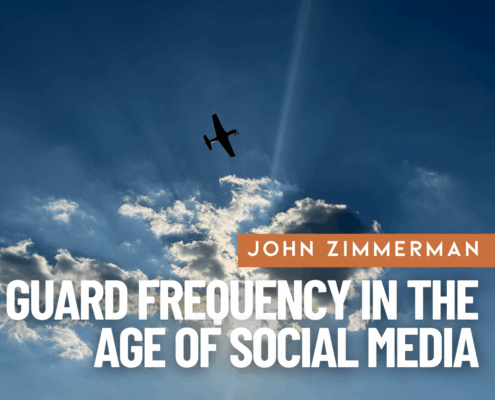
Guard frequency in the age of social media
John's blogYes, this is an “old man yells at cloud” article. Yes, I can already hear the jokes about the “guard police.” I don’t care. It needs to be said: Guard frequency (121.5) has become a national embarrassment, a sign that our self-absorbed social media culture has spread to the once-boring world of aviation. We need to do better.
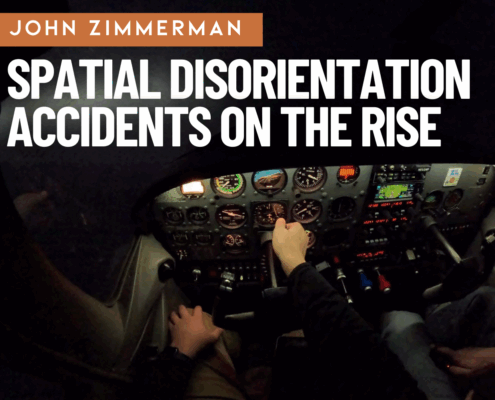
Why are spatial disorientation accidents on the rise?
John's blogResearchers from the FAA show that SD accidents have not declined since 2003—in fact, quite the opposite. You might assume the widespread adoption of tools like datalink weather, modern autopilots, reliable AHRS, and electronic flight bag apps would make VFR-into-IMC (the classic SD accident scenario) much less common. It’s a great theory, but the numbers don’t support it.

The aviation community is alive and well
John's blogBefore the expletive could even leave my mouth, one of the FBO employees offered to lend me the crew car. I assumed the crew car option would be impossible, or at least impossibly bad manners, since the round trip would be nearly two hours and the FBO was closing soon. But he wouldn’t hear it: “take all the time you need and just drop the keys off with the night security guard. We appreciate your business.”
I Can’t Believe I Did That
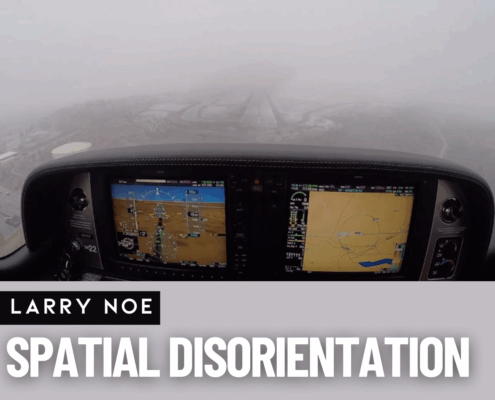
Spatial Disorientation: I Thought It Couldn’t Happen to Me
I Can't Believe I Did ThatI began climbing to get between layers, intending to stabilize and then request IFR. But as I entered the clouds, what I thought could never happen did. I was in an unusual attitude: 45 degrees banked and nose down. For a moment, I considered pulling the CAPS parachute. I had often wondered if I’d have the presence of mind to use it in a real emergency. After this, I know the answer is yes. But I also realized I could recover.
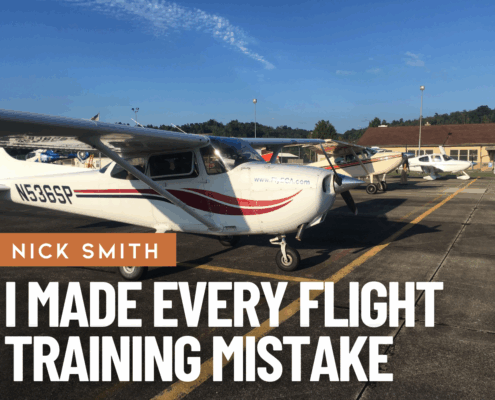
I Made Every Flight Training Mistake Humanly Possible
I Can't Believe I Did ThatFlight training is rarely a straight line, but for Nick Smith it turned into a winding, four–year journey full of delays, false starts, and unexpected costs. In this brutally honest account, he shares the mistakes he made—so future pilots don’t have to repeat them. His story is both a cautionary tale and a reminder that perseverance can still lead to the certificate.

A Quarter Tank and a Prayer
I Can't Believe I Did ThatI was watching the fuel gauges drop before my eyes. I elected to continue to ECG rather than turn back. I was on a direct course. The Norfolk controller wished me luck—not the most reassuring sign—and handed me off to ECG Tower, who had already been briefed.
Opinion
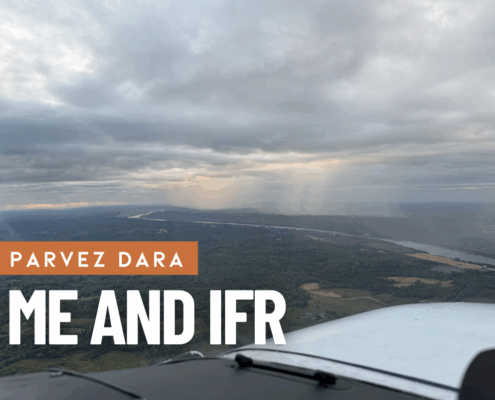
Me and IFR
OpinionDuring another smooth cloudy day, a relative—who shall remain unnamed—asked if I wanted to fly. Weather was marginal VFR; he had his IFR rating. At 3,000 feet, we entered clouds. I panicked briefly, deer-in-headlights style. Calmly, he asked me to hand him his foggles from the seat pocket. Did that give me confidence? Not really. But the flight remained calm and uneventful. He wore view limiters in clouds for comfort—something I couldn’t quite fathom at the time.
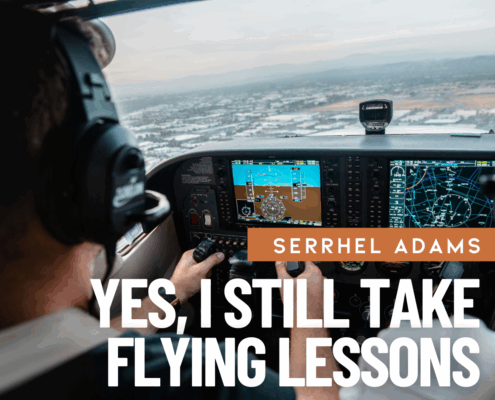
Yes, I Still Take Flying Lessons
OpinionI approach every flight with an instructor with a plan of my own. I don’t just show up because the calendar says it’s time. I bring specific goals, real-world questions, and skills I want to sharpen. My annual IPC isn’t about checking FAA boxes; it’s about tackling challenges I’ve faced over the year and flying approaches that have pushed me.

Generally Affordable? The Truth About Flying Costs
OpinionThe economics of flying is not for the faint of heart. In fact, the average cost of just getting your “license to learn” is now hovering around the $20,000 mark. And if that number doesn’t faze you, then let me sprinkle in some rampant inflation, a tight insurance market, and just the high opportunity cost of staying current—let alone proficient—into the mix.
More Articles
Recent Posts
Email newsletter
Write for us!
Did you know that most of the articles at Air Facts are written by readers like you? You do not have to be Richard Collins or Ernest Gann – simply a GA pilot with a story you’d share with friends sitting in the hangar.
